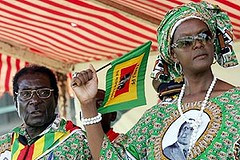
Zimbabwean President Robert Mugabe along with First Lady Grace. She made a powerful and defiant speech calling for the continuation of ZANU-PF rule in this southern African nation.
Originally uploaded by Pan-African News Wire File Photos
Thursday 16 December 2010 / by Alice Chimora
Lawyers for Zimbabwe’s First Family, the Mugabes, have, in recent weeks, been busy repairing the damaged image of their clients shortly after revelations from WikiLeaks, the controversial whistle-blower website, was published by a local newspaper. Meanwhile, President Mugabe’s lawyers are seeking to debunk a lawsuit that was filed by Prime Minister Tsvangirai against their client.
On Tuesday December 14, lawyers representing President Mugabe, who is being sued by his political rival, premier Morgan Tsvangirai, for appointing provincial governors without consulting him, said that the law does not allow for a sitting President to be sued. According to them, Tsvangirai’s court action was "ill advised”.
Twenty four hours later, Grace Mugabe, the president young wife, filed a $15 million lawsuit against a leading weekly, the Standard, over a story it picked from the controversial Wikileaks website. The article in dispute was titled “First Lady Grace Mugabe, Gono in diamond scandal”. It was published on Sunday December 12.
Wikileaks reports fingered Grace Mugabe together with several high ranking Zimbabwean officials as individuals who had “reaped tremendous profits” from illicit dealings in the Chiadzwa diamonds.
Grace is worried that the publication chose to name her and Reserve Bank Governor Gideon Gono as being involved in the diamond scandal when WikiLeaks had named other prominent persons in Zimbabwe. And a very hurt, but supposedly richer, Grace Mugabe says the article has lowered the respect with which she is held as “the mother of the nation” to “a point of disappearance”.
Grace Mugabe’s suit
“The said words, in the context of the article, being false, scandalous, and malicious are wrongful and defamatory of plaintiff, in that they were intended and were understood by readers of the newspaper and the online publication (readers), to convey the scandalous aspersion that plaintiff, (the First Lady, wife of the President of the Republic of Zimbabwe), engaged in criminal and unsavory activities . . .” part of her court papers filed at the High Court on Wednesday read.
The classified cables implicating Grace were written by the former US ambassador to Zimbabwe, James McGee, in November 2008. Also named in the Wikileaks are Vice-President Joice Mujuru and intelligence boss Happyton Bonyongwe.
According to Grace, the article implies that besides being corrupt, her conduct was “one of the dirtiest” and also that she was complicit in the murder and displacement of thousands of people because of her participation in the illicit trade in the gemstones.
“This is an imputation of criminality, and an association with violations of human rights,” Mugabe’s lawyers said.
The publication has in the past two months attracted high profile lawsuits. Deputy Prime Minister Thokozini Khupe filed a $500 000 suit over a story that claimed that Grace Mugabe was pregnant. She denied being so.
Robert Mugabe
Meanwhile, President Mugabe’s opposing affidavit filed by Mawxell Ranga states that in terms of Rule 18 of the High Court Rules, RGN1047/1971, it was not possible to sue a sitting President.
The rule reads: “No summons or other civil process of the court may be sued out against the President or against any of the judges of the High Court without the leave of the court granted on court application being made for that purpose.”
Ranga said it was clear from the said Rule that leave to institute proceedings against the President was required before an application could be instituted against him.
But Tsvangirai maintains that as Prime Minister of Zimbabwe as defined in the Global Political Agreement signed by the three principals, Mugabe should have consulted him before re-appointing the governors.
No comments:
Post a Comment